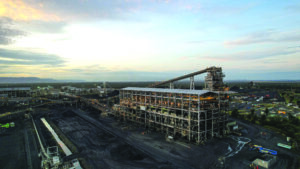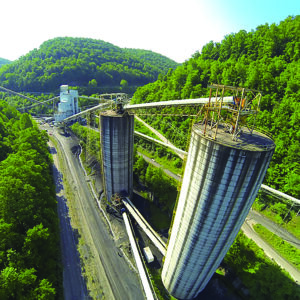
Alan Svoboda (standing) and his team at Sev.en GI are investing in coal mines and coal-fired power plants. (Photo: Sev.en GI)
Czech-based group builds a coal-powered portfolio that invests in ESG-deprived assets
By Steve Fiscor, Editor-in-Chief
Last year was an important year for Sev.en Global Investments (Sev.en GI). The investment group made several strategic acquisitions in the coal business, buying up coal reserves in the U.S. and Australia before announcing an agreement to acquire a 51% interest in Coronado Global Resources. Toward the end of the year, they signed an agreement to purchase the Mong Duong 2 coal-fired power plant in Vietnam. When investors discuss potential acquisitions these days, coal and its related industries are nowhere near the top of the list, unless it’s Sev.en GI.
While the Sev.en GI name may be new to some in the industry, the group has extensive coal experience. It owns and operates coal mining operations and coal-fired heat and power plants in Central Europe and Australia. In 2019, they entered the coking coal market in a big way with the purchase of Blackhawk Mining in the U.S. Coronado will add to that met portfolio with operations in the U.S. and Australia.
Sev.en GI is part of the Sev.en Group, which is owned by Pavel Tykač, a prominent Czech entrepreneur and investor, who ranks among the world’s top 300 wealthiest people, according to Forbes. “We belong to a private, family-owned group and the head of the family is a keen energy asset investor,” said Alan Svoboda, CEO for Sev.en GI. “He understands that coal is essential to the production of power and steel. We began by acquiring assets step-by-step in Central Europe and today we have a large portfolio of coal-fired heat and power plants fully vertically integrated with mining operations. The local coal mines provide the security of supply.”
Power delivery systems worldwide are in a state of transition. In many places coal is being retired in favor of nuclear- and gas-fired capacity, and more renewable energy sources. During this transitory period, however, Sev.en GI believes that coal assets will remain essential, Svoboda explained. “That has become the investment theme for taking an international approach,” he said.
Svoboda joined the group in 2018 with a mandate to look for international investments and establish a global presence in the energy business. Over time, the group realized that metallurgical coal is an equally robust commodity investment as an input for the steel industry. “We also learned that we could gain exposure to the business by purchasing the tenements (leases), or the rights to mine the natural resources and collect royalties from third parties,” Svoboda said. “That has become another investment focus for us in both the U.S. and Australia.”
Sev.en GI remains focused on conventional power generation. They are looking at coal-fired power assets in the U.S., but the American market has its own specific characteristics “The market is divided into regions with different rules and policies for compliance and pricing,” Svoboda said. “Some are more regulated. Some are more liberal. It requires a detailed understanding of the dynamics to be able to make a good decision on which assets still will have some viable future before the transition renders them obsolete.”
Investing in ESG-deprived Industries
Sev.en GI is placing capital in areas where other investment groups cannot. Today, environmental, social, and governance (ESG) policies are limiting many investment decisions and forcing many investors to divest interests in carbon intensive projects. “In the past, companies were doing well by maintaining their legacy assets and investing in new projects at the same time, but over time the investment climate became polarized,” Svoboda said. “A company that wants to be viewed as green needs to rid itself of legacy assets with high carbon intensity before they become toxic elements in their portfolio. Cheap credit funding has been limited. Equity investors and pension funds want to avoid any exposure to carbon-intensive industry. Today, we are seeing an outflow of equity capital and debt from what we call ‘ESG-deprived industries.’
“These operations are essential for the energy transition to occur,” Svoboda said. “In some rare cases, a grid operator or power supplier could close a plant because they have additional capacity, or the system is robust enough to digest that change in the supply-demand balance. In many cases, however, a transitional period is needed to adapt to the cost drivers and strengthen the grid to compensate for the intermittency of renewable sources. We are filling a gap where institutional investors are leaving assets behind that still need to have a responsible, focused owner before they can be completely shut down.”
Svoboda emphasizes that Sev.en GI is not a private equity investor that would get into a business only to look for ways to exit again, “dressing up the bride for the next marriage.”
In many of these cases, there may not be a next marriage. “We will likely be the final owner of the assets, but we want to be a responsible owner that invests where it makes sense to provide for the employees and the communities as long as it’s economically rational,” Svoboda said.

Sev.en GI is awaiting approval of its 51% acquisition of Coronado Global Resources, which operates the Curragh coking coal complex in Australia and the Buchanan mine in the U.S. (Photo: Coronado Global Resources)
Conventional power plants were commissioned to produce base load power. “Now flexibility matters because during certain periods the grid accepts renewable energy, which shrinks the demand for coal-fired power,” he said. “During other periods, coal-based generation is the only way to satisfy demand.”
Sev.en GI’s investments usually focus on increasing that flexibility and the group is not afraid of merchant risk. Power producers are increasingly selling energy as merchants rather than relying on fixed-price contracts. “Many institutional investors cannot tolerate merchant risk because of the inherent uncertainties of the cashflow created by market volatility,” Svoboda said. “Our assets in Central Europe operate as merchant assets. There are times when margins are thin, but there are other times when operations are quite profitable.” Knowing how to manage merchant risk while working with conventional assets, sets Sev.en GI apart from other investors.
The Blackhawk Acquisition
Aside from being a met coal producer, another factor that made Sev.en GI’s acquisition of Blackhawk Mining unusual was that it took place during the COVID-19 pandemic. “We were not allowed to travel to the U.S. to visit the mines,” Svoboda said. “It was an internet transaction as we did not meet any of the people in person until months after closing. Nevertheless, we performed due diligence. We gained some metallurgical coal experience working with Corsa Coal a few years before and Blackhawk became a second met coal target for us.”
That situation exemplifies Sev.en GI’s readiness to take on some risk. In addition to the obstacles created by the pandemic, coal prices were low. Many parts of the economy, including steel markets, had slowed. Blackhawk’s creditors were knocking at the door. Many companies were looking to cut costs and lay people off. Sev.en GI made an offer to the creditors and shareholders, many of whom were the same due to a prior bankruptcy.
“The creditors and shareholders were mainly hedge funds that were not able to get aligned as far as who would provide the capital for the company to survive,” Svoboda said. “Under such circumstances, they accepted our offer. We would buy all the debt and equity and provide the capital for the business on our own. It happened, as we say, ‘just a few minutes before the clock struck 12,’ meaning the company was on the verge of going belly up.”
In June 2020, Sev.en GI acquired Blackhawk Mining. “People were happy to see us step in, and we established a very strong bond with the management team,” Svoboda said. “Blackhawk’s CEO Jesse Parish is not only very knowledgeable about the coal business, he also understands the financial matters as a former CFO. He has been an exceptional CEO for us. Under his leadership and with the support of our cash and our mergers and acquisitions (M&A) team, we have managed to turn that business around.
“We began by revising mine plans and focusing operations on higher grade areas of the deposit,” Svoboda said. “We were able to get the operations on track just before the current met coal boom began. During those boom times, we maximized met coal production and benefited from the market rebound and hopefully that will remain so moving forward.”
Today, Blackhawk Mining is the fourth largest met coal producer with eight operations located in Kentucky and West Virginia. The company produces 7 million tons per year of hard coking coals and PCI coals.

The Kanawha Eagle mine is one of several coking coal mines operated by Blackhawk Mining, which Sev.en GI purchased in 2020. (Photo: Blackhawk Mining)
Building a Reserve Base
Working with Blackhawk, Sev.en GI also learned about land holdings, leases, mineral rights, and royalties in the U.S. In August 2021, the company formed Golden Eagle Land Co. Golden Eagle bought four coal companies: Wildcat Coal, Blue Creek Minerals, Colt, and Ruger Coal Co. The land holding company now controls more than 2.2 billion tons of proven coal reserves in Illinois, Ohio, West Virginia, and Wyoming.
“We assembled a portfolio of land with mining rights, and it’s administered by the people doing the same work for Blackhawk,” Svoboda said. “We work both sides of the fence, sometimes we pay royalties and sometimes we collect royalties.
“As it is with coal mining, there are similar dynamics with the ownership of mining rights and land holdings, which are typically owned by a trust or families that have inherited the land. Many of the trustees, who were never concerned about the source of their royalties, have decided to reduce their exposure to coal. We bought those mining rights and consolidated them in a portfolio under Golden Eagle. Today, we are still searching for more.”
The Coronado Acquisition
The big news last year for Sev.en GI was the agreement to acquire a 51% interest in Coronado Global Resources. The group is currently undergoing the transaction process and Svoboda could not comment in great detail, but he described it as a major step-forward transaction. “We were looking for ways to become a consolidator in the metallurgical coal industry, by adding more to our portfolio,” he said. “For two years, we were chasing opportunities in the U.S., Australia, and even Canada. I feel like we turned every stone over.”
The market volatility in the met coal business often complicates the deals. A sudden price swing can change the attitude of the buyer or the seller and sour the deal. “That’s why we were happy that we were able to negotiate a bilateral deal with the Energy & Minerals Group (EMG), the 51% owner and a Coronado founder based in Texas,” Svoboda said.
Coronado Global Resources is one of the largest met coal producers globally, supplying customers on five continents with a range of high-quality coals. They produce met coal from three mining complexes, in two of the largest coal basins in the world — the Bowen Basin in Queensland, Australia, and the Central Appalachian coalfield in the U.S. In total, they operate eight safe, highly productive coal mines with immediate access to transportation infrastructure. Coronado produced 16 million metric tons (mt) of metallurgical coal in 2022 and plans to grow production to 20.5 million mt in 2025.
Coronado was founded in 2011 by EMG, Garold Spindler, and James Campbell. Through a series of strategic acquisitions, they assembled an impressive met portfolio and eventually listed the company on the Australian Stock Exchange. “From day one, Coronado has had a strategic owner, which appealed to us,” Svoboda said. “We seek control and we believe that with active oversight and financial support, we can generate some additional value for all shareholders as opposed to a passive investor.”
The transaction is now pending. The two parties awaiting approvals from the different authorities in the U.S. and Australia.
Building a Power Portfolio
In late 2022, Sev.en GI acquired a 100% share in Delta Electricity which owns and operates the coal-fired Vales Point Power Station in Australia. “When Australia reopened from COVID-19, which was a year after the U.S. reopened, we flew there the very first day and began building personal relationships, which led to another private transaction where we bought a large coal plant called Delta in New South Wales from two private persons together with an adjacent coal mine,” Svoboda said.
The plant is critical in supporting the security of energy supply and network reliability as it provides 4% of annual power for the Australian national grid. “We became familiar with Australia as an investor and also with the Australian power markets,” Svoboda said.
Sev.en GI began assembling an Australian power portfolio with Delta and the other two assets, under Genuity, where the company is only a minor shareholder, but things went awry. At one of the units at Genuity´s Callide C power station the turbine exploded in May 2021. Later in 2022, the cooling towers collapsed at the other unit. The power plant has been offline since the failures. “The Genuity power assets did not materialize as originally envisioned, but today we have an Australian power portfolio that includes a large coal-fired power plant that we own and manage,” Svoboda said. The group now owns Delta Electricity with an adjacent mine and also Sev.en Royalties that owns a sizeable portfolio of mining rights in Australia.
Sev.en GI Enters Asia
In December 2023, Sev.en GI signed an agreement to purchase the Mong Duong 2 coal-fired power plant in Vietnam from AES Corp. “During high times, AES had a lot of interesting IPP projects all over the world,” Svoboda said. “More recently, however, they have shifted from investing to divesting and this was one of their last international assets.”
AES attempted to sell Mong Duong 2 a couple of years ago, but the investors, which were a financial group that lacked operating experience, did not receive approval from the Vietnamese government, Svoboda explained.
“We convinced both AES and eventually the Vietnamese representatives that we have plenty of experience in conventional power generation and that we would be a suitable owner of the asset,” Svoboda said. “With that trust, AES signed a contract with us. We are still awaiting an official approval from the Vietnamese government. But given the initial contact and our profile, we are truly convinced that this is just a matter of time to get us signed off for closing the deal.”
Looking toward the future, Svoboda said the focus remains the same. Sev.en GI likes coal-fired power assets, especially ones with captive coal mines. “We’re interested in met and thermal mines too,” Svoboda said. “Unlike other investors, we can manage both. Some mining companies are focusing on met and spinning off thermal assets.” He said they are also considering steel mills as well.
“To some degree, we are an opportunistic investor, unlike a large corporation that sets unattainable targets to fund projects or service debt,” he said. “The money is allocated to the best opportunities we find around the globe, and we will see where that takes us.”

